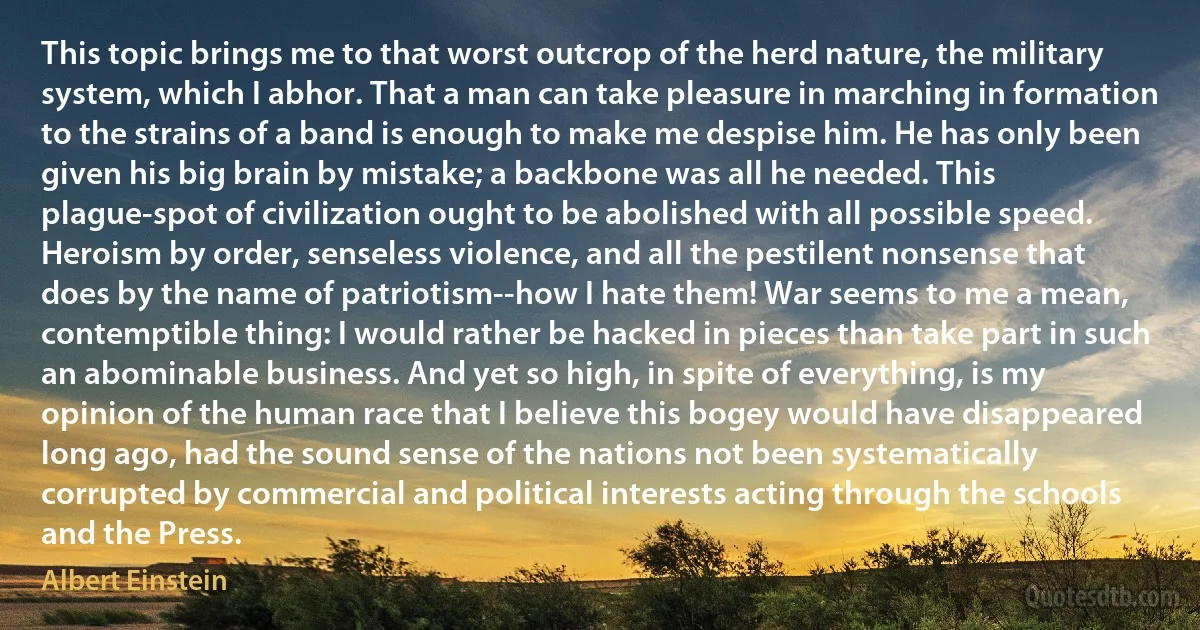
This topic brings me to that worst outcrop of the herd nature, the military system, which I abhor. That a man can take pleasure in marching in formation to the strains of a band is enough to make me despise him. He has only been given his big brain by mistake; a backbone was all he needed. This plague-spot of civilization ought to be abolished with all possible speed. Heroism by order, senseless violence, and all the pestilent nonsense that does by the name of patriotism--how I hate them! War seems to me a mean, contemptible thing: I would rather be hacked in pieces than take part in such an abominable business. And yet so high, in spite of everything, is my opinion of the human race that I believe this bogey would have disappeared long ago, had the sound sense of the nations not been systematically corrupted by commercial and political interests acting through the schools and the Press.
Albert EinsteinRelated topics
believe big bogey brain business commercial enough everything formation given hate herd high human man mean mistake name nature opinion order ought pleasure possible race sense sound speed take thing topic war worst yetRelated quotes
From what can "ought" be derived. The most compelling answer is this: ethics must be somehow based on an appreciation of human nature - on a sense of what a human being is or might be, and on what a human being might want to have or want to be. If that is naturalism, then naturalism is no fallacy. No one could seriously deny that ethics is responsive to such facts about human nature. We may just disagree about where to look for the most compelling facts about human nature -n novels, in religious texts, in psychological experiments, in biological or anthropological investigations. The fallacy is not naturalism but, rather, any simple-minded attempt to rush from facts to values. In other words, the fallacy is greedy reductionism of values to facts, rather than reductionism considered more circumspectly, as the attempt to unify our world-view so that out ethical principles don't clash irrationally with the way the world is.

Daniel Dennett
From the first appearance of man upon the earth, down to very recent times, the words "stranger" and "enemy" were quite or almost, synonymous. Long after civilized nations had defined robbery and murder as high crimes, and had affixed severe punishments to them, when practiced among and upon their own people respectively, it was deemed no offence, but even meritorious, to rob, and murder, and enslave strangers, whether as nations or as individuals. Even yet, this has not totally disappeared. The man of the highest moral cultivation, in spite of all which abstract principle can do, likes him whom he does know, much better than him whom he does not know. To correct the evils, great and small, which spring from want of sympathy, and from positive enmity, among strangers, as nations, or as individuals, is one of the highest functions of civilization.

Abraham Lincoln
Mankind has advanced. Human progress is ceaseless. We can look at Bosnia or Zaire or Rwanda and conclude that building just societies is a fool's errand. We are always, despite our advances, only one sin away from slipping into the abyss of terror and ignorance.
But that is not so. Generations upon generations have driven the human race farther and farther from darkness. Past episodes of abominable human cruelty are kept vivid in the memories of succeeding generations. "Never again," is the admonition passed from the survivors of the Holocaust to their descendants and to us all. And although such an important reminder will not always prevent the occurrence of cruelty and violence even at levels approaching genocide, the civilized world is more inclined to organize opposition to such tragedies if not as early as we should, at least sooner than we once would have.

John McCain
Capitalism should not be condemned, since we haven't had capitalism. A system of capitalism presumes sound money, not fiat money manipulated by a central bank. Capitalism cherishes voluntary contracts and interest rates that are determined by savings, not credit creation by a central bank. It's not capitalism when the system is plagued with incomprehensible rules regarding mergers, acquisitions, and stock sales, along with wage controls, price controls, protectionism, corporate subsidies, international management of trade, complex and punishing corporate taxes, privileged government contracts to the military-industrial complex, and a foreign policy controlled by corporate interests and overseas investments. Add to this centralized federal mismanagement of farming, education, medicine, insurance, banking and welfare. This is not capitalism!

Ron Paul
There are three basic theories about this coming Final Empire, or The New World Order.
1. It will be a revival of the Roman Empire, where ten European countries try to band together, maybe like the European Common Market.
2. It will be an attempted union of ten world regions, like a North American Region, Asia-Pacific Region, etc.
3. It will be an alliance of 10 Muslim countries that surround (and hate) Israel and have for 4,000-years!
My study has led me to believe this final 10 nation empire will be 10 Muslim nations since they all hate each other and fight all the time just as God said they would in Genesis 16:12. They will never really "bond,” just as iron and clay will not bond with each other. Since this kingdom will have areas where enforcement of their rules and policies (like maybe taking a mark to buy and sell (Revelation 13-14)?) will be "weak” or "broken,” I have long prayed for God to put me some place where it is broken!

Kent Hovind
